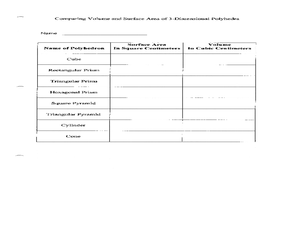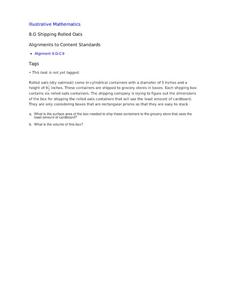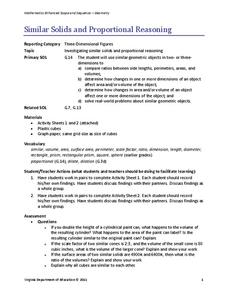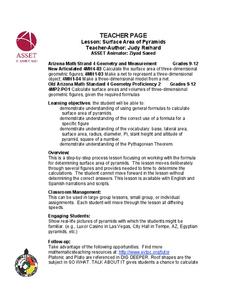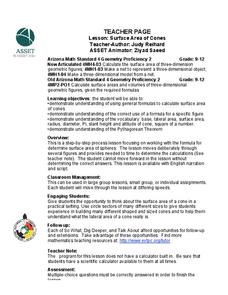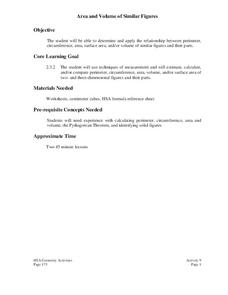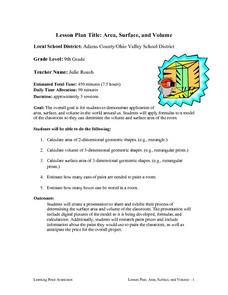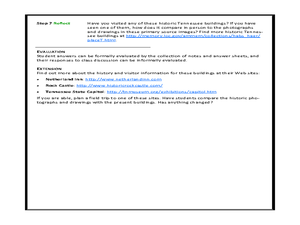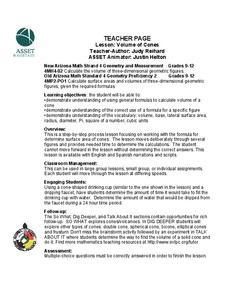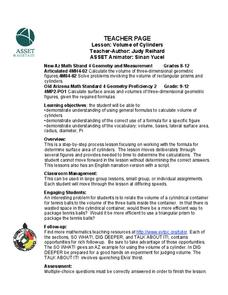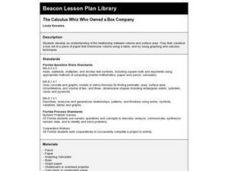Curated OER
Solid Surface Area
Students calculate the area of solids. In this geometry lesson, students use formulas to find the surface are and the volume of solids. They investigate 3-dimensional shapes.
Virginia Department of Education
Volume of a Rectangular Prism
Fill the minds of your young mathematicians. A hands-on activity has learners fill in a rectangular prism with unit cubes to determine its volume. the exercise provides a great hands-on way for learners to connect the activity to the...
Curated OER
Shipping Rolled Oats
What better way to start your day than with a box of oatmeal? Or what better way to start your geometry class than by calculating its volume? Eighth graders discover just how practical volume computation can be in business and in breakfast!
Santa Monica College
Introducing Measurements in the Laboratory
We use basic units of measurement to break down things and communicate clearly. The first lesson in an 11-part series teaches the proper way to measure various items. It starts simply with measuring the dimensions and areas of geometric...
Curated OER
Volume Of A Prism
Eighth graders investigate the concept of a prism and finding the volume. They begin the inquiry by attempting to find the surface area in order to begin the inquiry. Students are expected to apply memory for the mathematical formulas in...
Virginia Department of Education
Similar Solids and Proportional Reasoning
Double the dimensions, quadruple the surface area. Pairs build similar prisms and compare the ratios of their surface areas and volumes to the ratio of the heights. Given two similar cones, partners determine the ratios of the lateral...
Curated OER
Surface Area of Pyramids
Pupils identify the surface area of pyramids and other polygons. In this geometry lesson, students find the different measurements for the different parts of a polygon. They use the surface area formula to solve for the surface area,
Curated OER
Surface Area of Cones
Learners find the surface area of cones. In this geometry lesson plan, students calculate the dimensions of each three-dimensional shape and use the correct formula to solve the problem. They relate concepts of cones to the real world.
Curated OER
Volume & Candy Creations Model
Sixth graders investigate surface area. In this surface area instructional activity, 6th graders design a box of candy that has a volume of 30 cubic inches. Students are trying to minimize surface area while keeping volume constant. ...
Curated OER
Perimeter and Area of Similar Figures
Learners determine the relationship between perimeter, circumference, area, surface area, and/or volume of similar figures and their parts. They complete activities related to the question. Answer key included.
Curated OER
Investigation-On the Surface
Young scholars compute the surface area of 3 geometric solids to determine the shape of package that would require the least amount of paper to wrap. In this geometry lesson, students work on a two-question assessment embedded in the...
Curated OER
Area, Surface, and Volume
Ninth graders demonstrate application of area, surface, and volume. They apply formulas to a model of the classroom so they can determine the volume and surface area of the classroom.
Curated OER
NetsS.A. of Prisms
Young scholars build nets of three-dimensional prisms based on the dimensions they are given for hexagonal prism, triangular prism, rectangular prism. Working in groups, they use their prisms and calculate the Surface Area and Lateral Area.
Curated OER
Finding the Area & Volume of Buildings Using Architectural Drawings
Fifth graders find the area and volume of buildings. In this architecture lesson, 5th graders look at the drawings of three historic Tennessee buildings. They use these to help find the area and volume of the building.
Curated OER
Chemical Reaction Rates
High schoolers observe demonstrations to show factors that affect rates of chemical reactions. For this rates of chemical reactions lesson, students investigate how catalysts, reactant concentrations, temperature and surface area affect...
Curated OER
Volume of Cones
Students identify the volume of cones and pyramids. In this geometry lesson, students derive the formula for cones and pyramids. They calculate the volume of cones and other three dimensional shapes.
Curated OER
Cylinder Volume Lesson Plan
Tenth graders define the formula for cylinders and use it to solve real world problems. In this geometry lesson, pupils differentiate between area, perimeters, 2D shapes, 3D shapes, and volume of prisms, cylinders and spheres. They...
Curated OER
Volume of Cylinders
Middle and high schoolers calculate the volume of cylinders. In this geometry lesson, learners differentiate between rectangular prisms and cylinders. They use the correct formula to solve for each solid.
Curated OER
Length, Perimeter, and Area
Students explore the concepts of length, perimeter, and area. In this math lesson, students use Shape Explorer to practice finding length, perimeter, and area.
Utah Education Network (UEN)
Candies R Us
A box is fun to make, especially when it's a candy box! These activities help to cement understanding of the difference between surface area and volume. Have individuals measure the surface area of their box in two-dimensions before...
Willow Tree
Measurement
Build a basic understanding of units of measure and create a great foundation for your learners. The lesson gives a complete overview of everything measurement, from types of measurement to rounding to conversions — it has it all!
Curated OER
Attack of the Raging River
Students explore mass and volume. In this mass and volume lesson, students pretend to be on a hike and have lost their way. Students must cross a river get back on track. Students must use mass, volume, surface area, density, property...
Curated OER
Geometry and Measurement
Young geometers explore relationships between units of measure and objects. Three activities provide varied opportunities to practice. Learners calculate the volume of two cylinders made by rolling a piece of paper vertically and...
Curated OER
The Calculus Whiz Who Owned a Box Company
Young scholars use the relationship between volume and surface area to construct a box out of a piece of paper that maximizes volume using a table and by using graphing and calculus techniques.


